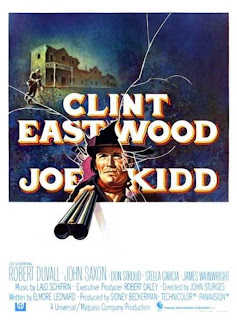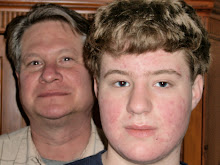Title: The Eiger Sanction
Released: 1975
Genre: Spy thriller
Notable for: Clint climbs mountains
Coolest thing Clint does: Dangles (for real) on a rope off a sheer rock face
Nothing sounds much stupider than the idea of Clint Eastwood playing a mountain-climbing assassin spy. The stupidity factor explains why neither of us ever watched "The Eiger Sanction" until compelled by the noble yet absurd duty of completing The Clint Eastwood Project.
Expectations were low, but we were both pleasantly surprised.
"Definitely worth watching," Andrew says. It is a passably interesting spy story sprinkled with gratuitous female nudity, humor now very politically incorrect, and legitimately striking mountain sequences.
Forgive us for being slightly confused about whether we are supposed to take the spy stuff entirely seriously. Much of it is more like "Get Smart" than James Bond. The spy boss is a "bloodless albino" far beyond eccentric. His right-hand man is an obnoxious tool who breaks out ridiculous karate skills to fight Clint. Clint's lifelong enemy is a swishy guy with a homicidal streak and a beefy bodyguard.
 The story starts with Clint, a college art-history professor, being both blackmailed and bribed out of retirement and back into the employ of a shadowy spy network. His specialty is assassination, or "sanctions." Clint is the only man for the job because he has mountain-climbing experience and one of two enemy agents to be killed is going on a expedition up the Eiger in Switzerland.
The story starts with Clint, a college art-history professor, being both blackmailed and bribed out of retirement and back into the employ of a shadowy spy network. His specialty is assassination, or "sanctions." Clint is the only man for the job because he has mountain-climbing experience and one of two enemy agents to be killed is going on a expedition up the Eiger in Switzerland.Clint's character is somewhat urbane and very jaded. He has disdain for his students, his spy network and even his country. In his assassin's view, America conducts itself no better than its enemies.
We suppose his character is also intended to be hip and worldly because he enjoys interracial love and his nemesis is a gay guy played by Jack Cassidy. The hipness falls flat but we laughed at the jokes because they are full of stereotypes no one would put on film now. Cassidy's gay character has a lapdog named "Faggot." Clint's main love interest is a "black chick" named Jemima. "Maybe your mother was turned on by pancakes," he tells her in allegedly flirty banter. He also has sex with a Native American girl who never says a word, as if the white fathers have not taught her their tongue. Clint himself puts on a stereotypical "cupcake" lisp as a disguise in one scene. We gather it was considered a hoot just to see Clint pretend to be gay.
Clint, as director and lead actor, was mostly interested in the mountain-climbing stuff. That's what makes the movie.
His character works to get back into mountaineering shape by looking up an old friend who runs a mountain-climbing school in the desert. The old friend is played by George Kennedy in his second Eastwood film in a row. For another return appearances, this is the third film in a row that shows Clint drinking Olympia beer. Malpaso must have had a product-placement deal with Olympia, because no one liked that beer that much.
Conveniently, Kennedy's mountain-climbing school has been transformed into a resort full of beautiful young women do nothing but lounge around in bikinis. Clint's trainer is the Native American girl who can run like the wind up mountains. To encourage Clint to keep up, she pulls ahead and pops her top to show her boobs. So there is some great film-making here.
Twists and turns of the spy story seem of secondary importance by the time they get on the Eiger. Clint and some other actors really went up on the mountain (helped by helicopters). They shot real climbing scenes and many of their own stunts. That stuff was real: One crew member was killed an another was seriously injured by a rock slide during production.
Mountain-climbers gave the film props for authenticity, despite a couple of gaffes only an expert would notice. Expert credentials are not necessary to see that, no matter how safely the stunts were staged, Clint had balls to do it.
Any real man respects a guy with balls. It's difficult to imagine any filmmaker today doing what Clint did to make this movie.
Next up: "The Outlaw Josey Wales."







